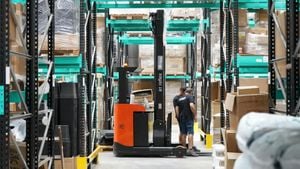Vietnam is implementing anti-dumping tariffs on hot-rolled coil steel imported from China, becoming the latest nation to combat rising imports from the world’s largest steel producer. Announced by the Ministry of Industry and Trade, these tariffs will take effect on March 7, 2023, and are set to last for 120 days.
These temporary tariffs, ranging from 19.38% to 27.83%, respond to concerns raised by local steel manufacturers, particularly Hoa Phat Group and Formosa Ha Tinh Steel Corp, who allege unfair pricing practices by Chinese firms. The dual aims are to protect Vietnam's domestic steel industry and to level the playing field amid increasing imports.
Vietnam stands as the largest importer of Chinese steel outside of China itself, with hot-rolled coils being one of the major products imported. Last year alone, China exported approximately 8 million tons of this steel to Vietnam. It is estimated the new tariffs will affect about half of this volume.
The trend of imposing anti-dumping duties isn't isolated to Vietnam; nations from South Korea to India have acted similarly, responding to the aggressive expansion of Chinese steel exports. This move reflects broader global trade dynamics as countries grapple with intimate connections to China’s vast manufacturing capabilities, particularly under the pressure of slowing domestic demand within China.
"The temporary tariffs will be between 19.38% and 27.83% and will last for 120 days," announced Vietnam’s Ministry of Industry and Trade. Such measures could exert significant pressure on Chinese steel prices as the industry adapts to changing demands.
Recent activities suggest this could force China toward tighter controls over its steel exports. Citigroup analyst Jack Shang remarked, "This should incentivize the Chinese government to launch another round of supply reform to boost supply discipline and improve industry profitability." His statement hints at potential shifts within the industry, aimed at stabilizing both supply and pricing amid heightened tariffs.
These developments occur against the backdrop of diminished construction activities within China itself, leading the nation’s producers to cast their nets wider, seeking markets abroad to offset domestic slowdowns. Historically, Chinese steel exports reached their highest volumes, serviced by surplus production capabilities.
The rise of protectionism among trading partners adds another layer of complexity to the global steel market. Steel futures witnessed fluctuations as the announcement unfolded, with prices dipping by as much as 1.8% on Chinese exchanges. Conversely, Vietnam’s steelmakers responded positively to the news, indicating confidence buoyed by the protective measures.
This policy shift reflects Vietnam's desire to bolster its own industrial competitiveness amid fierce foreign competition, promoting growth for local manufacturers at the potential expense of Chinese steel producers. Analysts suggest this could mark the beginning of more comprehensive efforts to assert control over the domestic market.
With the anti-dumping tariffs directed primarily at hot-rolled coils, future discussions may arise concerning additional measures on other steel products. Vietnamese authorities remain vigilant, indicating readiness to pursue additional inquiries should complaints arise from domestic players.
Overall, these tariffs represent not only immediate economic protection measures but are indicative of the larger narrative of global trade tensions, particularly those involving China and Southeast Asian economies. The situation continues to evolve, with stakeholders watching closely to see how these tariffs will reshape trade dynamics and industrial strategies across the region.



